Key takeaways:
- Email networking thrives on authenticity, genuine curiosity, and personal connections.
- Customer experience fosters loyalty and turns customers into brand advocates through emotional connections.
- Personalizing your emails and following up promptly can significantly enhance networking opportunities.
- Sharing experiences and vulnerabilities at networking events leads to deeper relationships and collaborative opportunities.
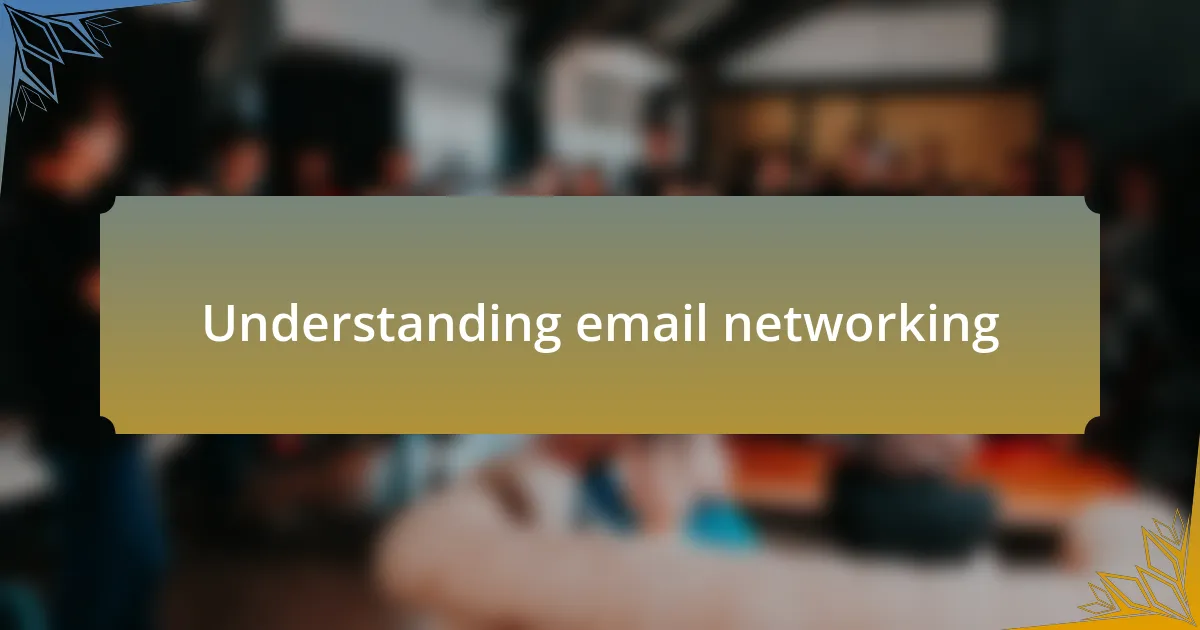
Understanding email networking
Email networking is more than just exchanging messages; it’s about building relationships that can last. I remember my first attempt at reaching out to someone I admired in the industry. I typed and retyped my email until I felt like it lost all meaning. Have you ever felt that way? It’s common to second-guess your approach, but authenticity often resonates more than perfection.
The essence of effective email networking lies in understanding the individual on the other end. When I crafted messages tailored to the recipient’s interests and achievements, I saw a noticeable difference in responses. It’s not just about what you say—it’s about how well you listen and connect. How often do we overlook the value of genuine curiosity in our outreach?
Moreover, the emotional undertone of your message can greatly influence the outcome. I recall receiving a heartfelt response after sharing a personal story about my journey in the industry. It reminded me that we connect on shared experiences and vulnerabilities. When was the last time you opened up in a networking email? Embracing that honesty can create a powerful bridge between you and your contacts.

Importance of customer experience
Customer experience plays a pivotal role in shaping how consumers perceive a brand. I once interacted with a company that prioritized customer feedback, and it profoundly affected my loyalty. Have you ever felt valued when your opinions were genuinely sought after? It’s an incredible feeling, and it fosters a sense of belonging.
When customers receive exceptional experiences, they tend to share those positive feelings with others, acting as brand ambassadors. I remember a time when a simple, personalized follow-up after a purchase turned my casual interest into a deeper connection. How powerful is it when a company invests in nurturing their relationship with customers? It not only drives retention but also attracts new customers through word-of-mouth.
Furthermore, the emotional connection established through effective customer experience can set a brand apart in a saturated market. For instance, I once chose a service based solely on how the team addressed my concerns with empathy and genuine care. Isn’t it amazing how emotions intertwine with our decision-making? When brands focus on creating memorable interactions, they don’t just gain customers; they build lifelong advocates.
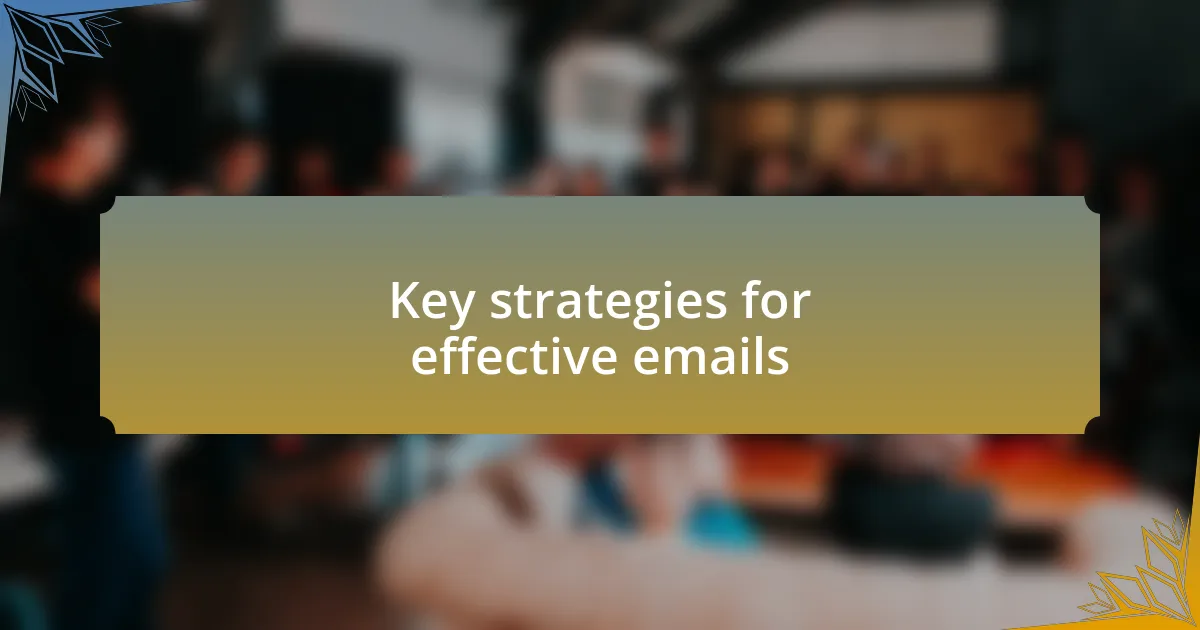
Key strategies for effective emails
Crafting effective emails remarkably enhances networking opportunities. I remember reaching out to a potential mentor and making sure my message was clear and concise. Have you ever experienced a long-winded email that left you unsure of the sender’s intent? That’s why keeping it brief and focused can make a world of difference.
Another strategy I’ve found invaluable is personalizing my emails. I always make a point to mention something specific I admire about the recipient’s work. This small touch can transform a generic email into a meaningful connection. When I opted to reference a recent article written by someone I wanted to connect with, the reply I received was enthusiastic. Doesn’t it feel nice when someone recognizes that you’ve taken an interest in them?
Lastly, timing can play a crucial role in email communication. I typically avoid sending emails during weekends or holidays when people are less likely to engage. Instead, I target mid-week mornings, which seems to yield better responses. Have you ever noticed a pattern in when your emails get replies? Observing these small nuances can significantly improve the effectiveness of your outreach.
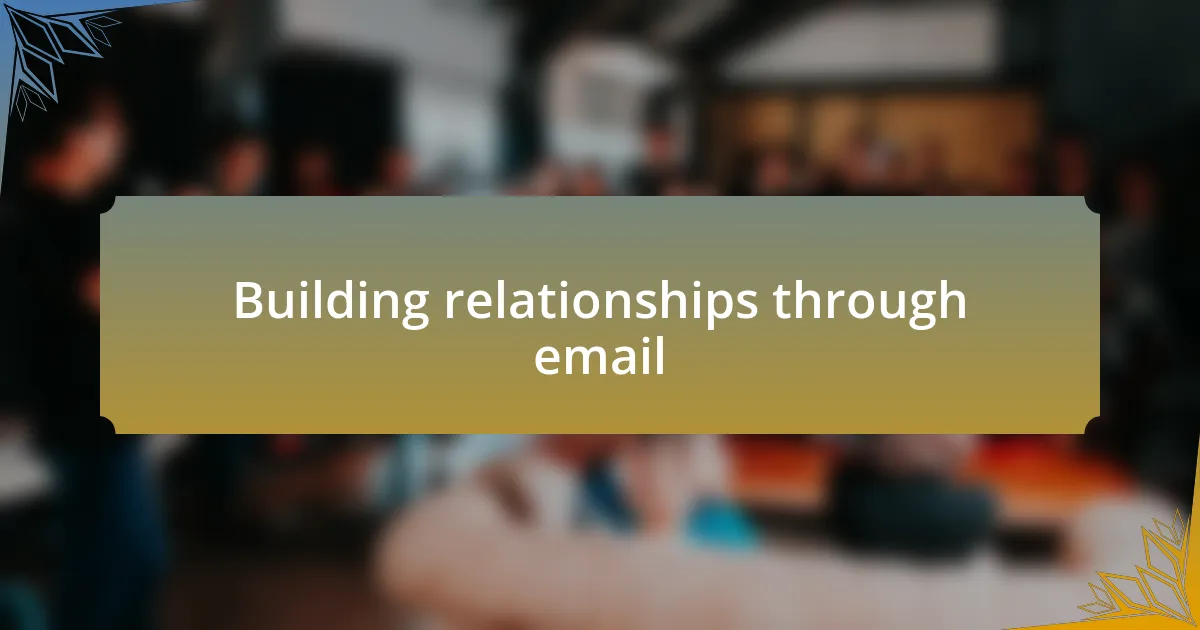
Building relationships through email
Building relationships through email requires a genuine approach. I recall a time when I reached out to someone whose work I deeply respected, and instead of simply asking for advice, I shared a bit about my own journey. This invitation to connect on a personal level set the stage for an engaging conversation. Isn’t it interesting how vulnerability can cultivate trust?
Another technique I’ve utilized is follow-up emails that nurture the conversation. After an initial exchange, I often send a friendly check-in or share an article that I think my contact might find useful. This not only keeps the relationship alive but also demonstrates my commitment to their interests. Have you ever received a follow-up that made you feel valued?
Lastly, I’ve found that expressing gratitude can truly solidify new connections. A simple thank you note after a meeting or a thoughtful response can leave a lasting impression. I once thanked a colleague for their insights after a conference, and they replied with an openness that led to fruitful collaboration. Does this resonate with you? It often surprises me how small gestures can lead to substantial relationships.
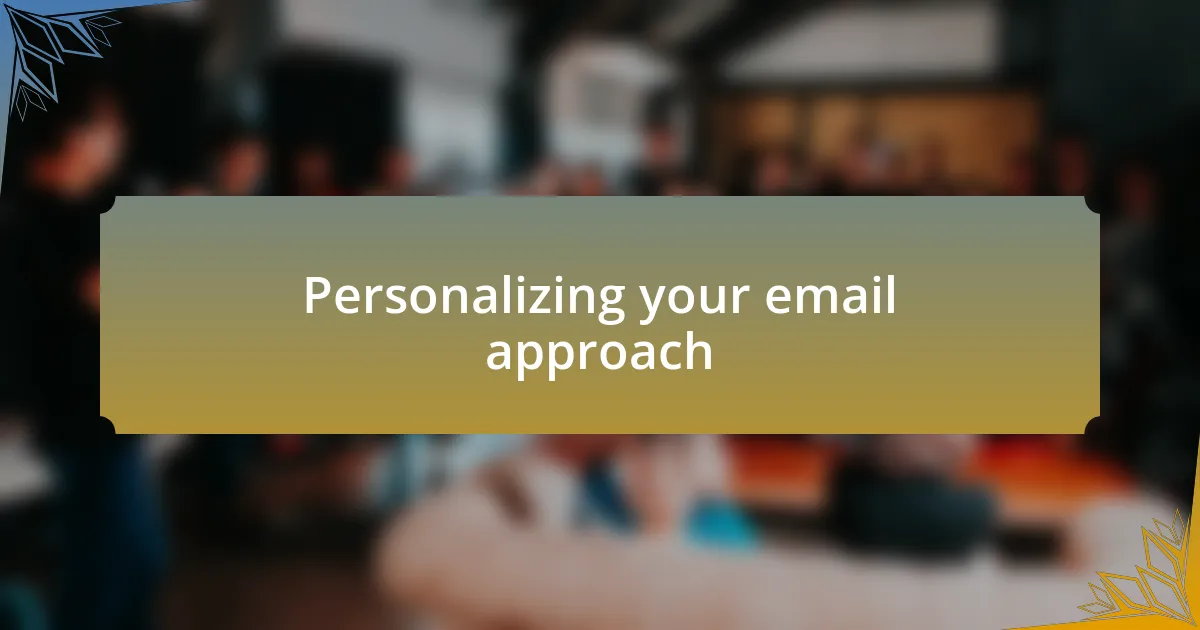
Personalizing your email approach
When personalizing my email approach, I often reflect on the specific interests and needs of the person I’m contacting. For example, I once researched a potential mentor’s recent publications before reaching out. By mentioning a particular article that resonated with me, I was able to create a more meaningful connection. Have you ever engaged someone by highlighting their work? It’s amazing how being specific shows genuine interest and lays the groundwork for a productive dialogue.
I also prioritize addressing recipients by name and customizing the email subject line to pique their curiosity. I remember crafting a subject line for a colleague that referenced a project they’d just completed, which immediately caught their eye. This small effort made a huge difference, transforming a standard outreach into a conversation starter. Don’t underestimate the power of a tailored subject – it can be the difference between an email that gets ignored and one that fosters connection.
In my experience, keeping a conversational tone in emails sets a comfortable foundation for building relationships. I always aim to weave in elements of humor or shared experiences, making my messages feel less formal and more relatable. A friendly remark about a recent industry event I attended once garnered an enthusiastic response from a previously unresponsive contact. Isn’t it fascinating how a touch of personality can spark engagement and open doors to future collaboration?
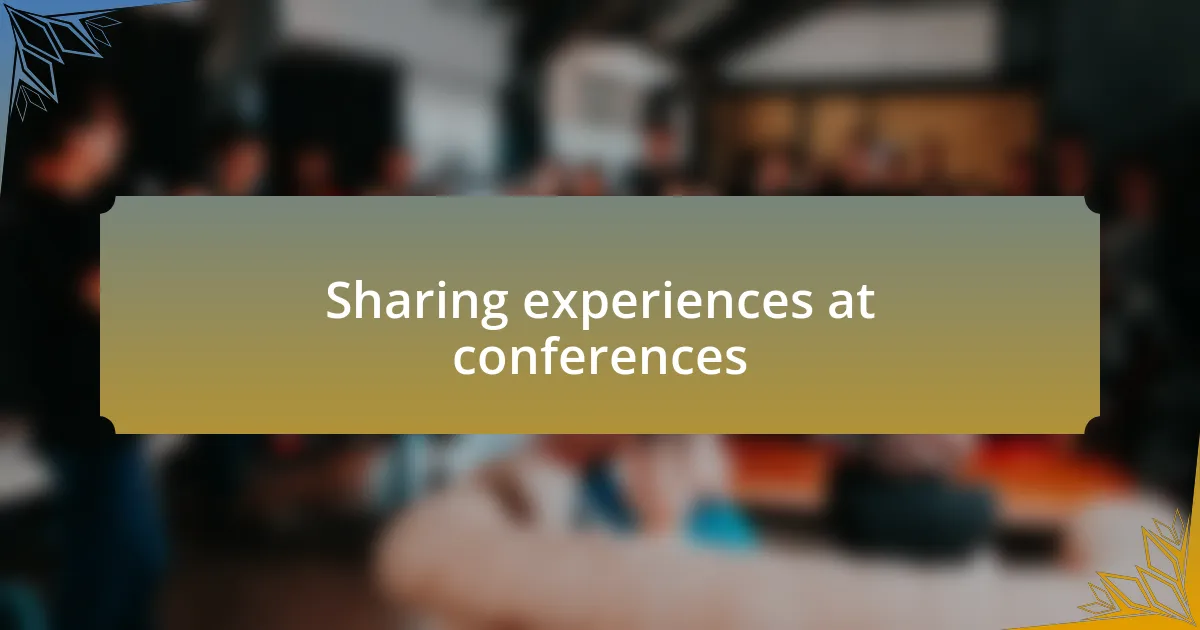
Sharing experiences at conferences
Attending conferences has always felt like a shared adventure for me. I recall an instance at a customer experience conference where I connected with a fellow attendee during a breakout session. We started swapping stories about our biggest challenges, and it created an immediate bond. Isn’t it inspiring how quickly shared experiences can turn strangers into allies?
What really strikes me about conferences is the spontaneous discussions that often spill out over coffee or lunch. One memorable moment was when I found myself in a conversation about a recent project failure that sparked a deep discussion on resilience. It was enlightening to realize that we all face hurdles, and sharing those stories not only humanizes our journeys but also encourages learning and growth. How many times have you found a nugget of wisdom during a casual chat that revolutionized your approach?
Lastly, I’ve noticed that expressing vulnerability can foster a deeper connection at these events. For instance, during a networking session, I shared a personal setback related to a customer initiative, and it led others to open up about their struggles as well. This exchange reminded me that acknowledging our challenges allows for a richer conversation, paving the way for genuine collaboration. Have you ever found that being authentic creates a safe space for others to share? It truly enhances the conference experience.
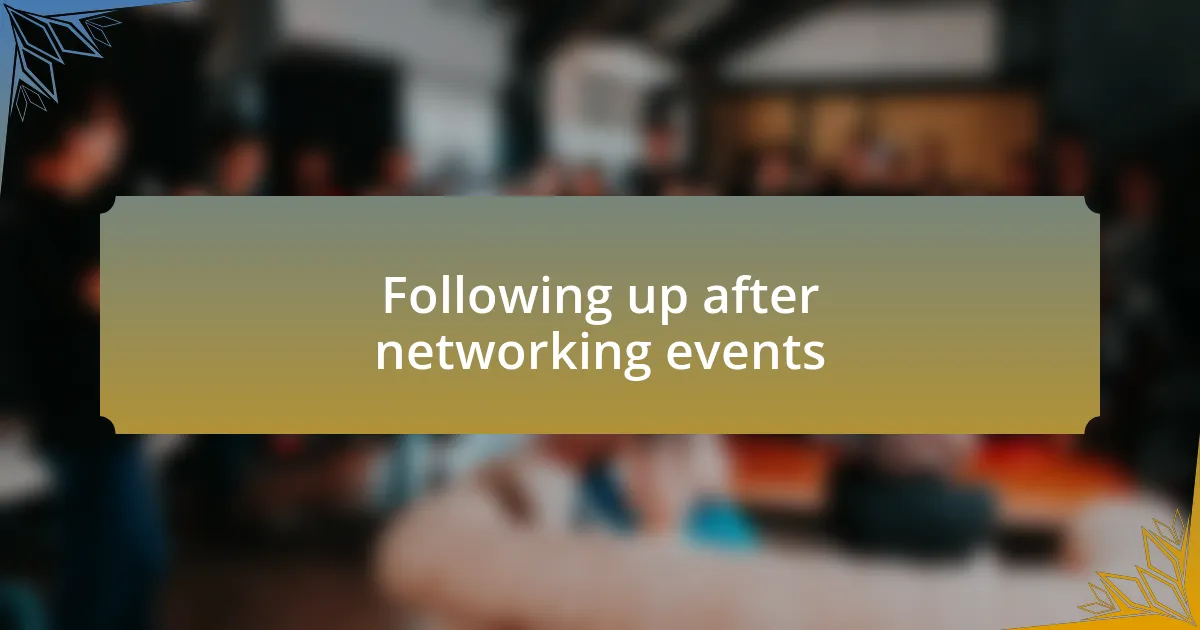
Following up after networking events
Following up after networking events is an essential step that I’ve learned can make all the difference in nurturing those newfound connections. After a particularly insightful conference, I made it a habit to send personalized thank-you emails to the people I connected with. A quick message acknowledging our conversation and expressing my appreciation not only serves as a reminder of our encounter but also helps to establish a lasting rapport. Have you ever wondered how a simple follow-up can reignite the excitement of a discussion?
In my experience, timing is crucial when it comes to following up. I’ve found that reaching out within 48 hours keeps the conversation fresh in both our minds. I once connected with a potential mentor at a networking event; I shot over a brief message the next day, and it led to a coffee meeting that transformed my perspective on customer experience strategies. Isn’t it remarkable how promptness can pave the way for unexpected opportunities?
Moreover, I’ve discovered the value of sharing relevant resources or insights during my follow-ups. For instance, after a conversation about effective digital marketing strategies, I forwarded an article I thought would resonate with my contact. This not only shows that I was actively listening but also positions me as a resourceful ally in their journey. Have you ever considered how adding value in your follow-up can strengthen your professional relationships?